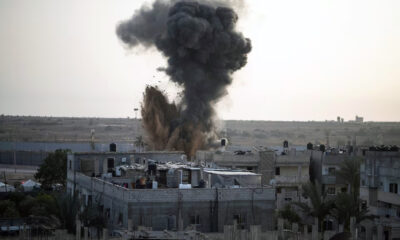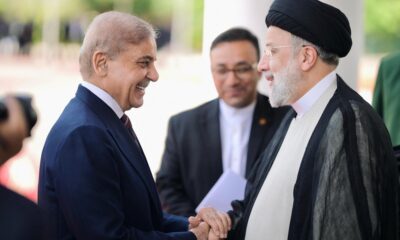Latest News
IEA official cites economic woes as a reason for closure of girls’ schools

A senior official of the Islamic Emirate of Afghanistan (IEA) has said that the financial crisis is the main reason for girls’ schools being closed.
“I think the main issue is the economic problem… all our funds are frozen outside the country,” Qalandar Ebad, the acting health minister, said in an interview with the BBC.
He said that funds are needed to build infrastructure and to pay teachers.
Apart from economic woes, there are also concerns about the syllabus and the way students dress, Ebad said.
He said a small number of female students are not happy about wearing headscarves.
In March, the IEA backtracked on their announcement that high schools would open for girls, saying they would remain closed until a plan was drawn up in accordance with Islamic law.
US special envoy for Afghan women, Rina Amiri, has said that the US will judge IEA based on their actions. She said that the ongoing sanctions against the IEA is because of their actions against women and human rights.
“IEA keeps promising they would reopen girls’ schools soon, but it seems they don’t want girls to continue their education. We want girls’ schools to reopen,” said Fatima Hamid, a teacher.
Latest News
Afghanistan now a ‘nexus for diplomatic endeavors’, says IEA

In the wake of dozens of meetings between high-ranking Islamic Emirate officials and visiting officials from foreign countries, and other diplomatic advances, the IEA said on Thursday that in the current geopolitical landscape, Kabul now “serves as a nexus for diplomatic endeavors and political deliberations pertaining to global affairs”.
In a series of posts on X, the IEA’s spokesman Zabihullah Mujahid said diplomatic missions and political delegations from various nations, including Russia, Malaysia, Kazakhstan, Turkmenistan, the European Union, and others, “are evident in the capital, highlighting its strategic importance in fostering Islamic cooperation”.
He said: “Recently, the honorable Minister of Transport of the Islamic Emirate, Mr. Hamidullah Akhundzada, led a significant delegation to Termez, Uzbekistan, for essential discussions aimed at enhancing bilateral relations.
“These discussions encompass a wide range of topics, from trade facilitation to security assurances, indicating a focused effort by the Islamic Emirate to strengthen and broaden its international engagements, thereby ensuring sustained development and stability.
“These initiatives, characterized by diligence and effectiveness, underscore Afghanistan’s enduring commitment to diplomatic engagement and its pivotal role in regional and global affairs,” he said.
Mujahid added that these initiatives “also emphasize the vital connection between diplomatic efforts and economic prosperity, promising favorable outcomes for Afghanistan’s socio-economic landscape.”
He pointed out that despite ongoing challenges, Afghanistan “remains steadfast in its pursuit of prosperity and resilience, defying pessimistic projections and charting a course towards political and economic renewal.”
He said: “Continued efforts are essential to fostering inclusive growth and impactful initiatives, thus advancing Afghanistan’s journey towards sustainable development and increased influence on the global stage.”
Latest News
Mullah Baradar discusses creation of railway with Kazakh deputy PM

Mullah Abdul Ghani Baradar, deputy prime minister for economic affairs has met with Erik Zhumangarin, the Deputy Prime Minister of Kazakhstan, and discussed the establishment of a railway network from Kazakhstan to Pakistan through Turkmenistan and Afghanistan, the deputy PM’s office said in a statement.
During the meeting, Baradar emphasized the need to sign agreements to solve the banking problems of traders from both countries, the creation of Afghan-Kazakh joint companies, and the facilitation of visas for Afghan traders.
According to the statement, the Deputy Prime Minister of Kazakhstan said that the Kazakh government intends to establish a joint chamber of industry and commerce and a joint trade and labor group between the two countries, and is ready to cooperate with Afghanistan in the sectors of e-governance, industry, higher education, education, health, and banking.
Latest News
Iran, Pakistan leaders raise concerns over ‘terrorist groups’ in Afghanistan

Following a two-day official visit to Pakistan, Iranian President Ebrahim Raisi and Pakistan’s Prime Minister Shehbaz Sharif issued a joint statement emphasizing the need to further expand commercial and economic cooperation and transform the common border of the two countries from a “border of peace” to “border of prosperity”.
The two leaders also strongly condemned aggressions and crimes of Israel in Gaza, and demanded an immediate and unconditional ceasefire, as well as unimpeded humanitarian access to the besieged people of Gaza.
Numerous other issues were also discussed but on the topic of Afghanistan, they jointly declared their commitment to the development of Afghanistan as a peaceful, united, independent country free from the threats of terrorism and drug trafficking.
According to the statement the two countries pointed out that the existence of terrorist organizations in Afghanistan is a serious threat to the security of the region and the world.
The two sides stressed their desire to strengthen cooperation in the field of fighting terrorism and ensuring security and creating a united front against terrorism.
They also discussed the importance of coordinating regional and international efforts to ensure security and stability in the region.
“While respecting the sovereignty and territorial integrity of Afghanistan, the two sides recognized that increasing participation of all strata of Afghans in basic decision-making will lead to the strengthening of peace and stability in this country,” the statement read.
-

 Sport5 days ago
Sport5 days agoAfghanistan Champions League kicks off with grand opening ceremony
-

 Latest News4 days ago
Latest News4 days agoPakistan’s frontiers minister stresses ‘dignified’ return of Afghan refugees
-

 Latest News5 days ago
Latest News5 days agoMore than 800 Afghan refugees deported from Pakistan in two days
-

 Regional3 days ago
Regional3 days agoIranian president lands in Pakistan for three-day visit to mend ties
-

 Climate Change4 days ago
Climate Change4 days agoMassive river flooding expected in China, threatening millions
-

 Latest News4 days ago
Latest News4 days agoChinese keen to invest in Panjshir-Kabul water conduit project
-

 World4 days ago
World4 days agoTwo Japan navy helicopters crash, one body found, 7 missing
-

 Latest News2 days ago
Latest News2 days agoRashid Khan named AWCC’s brand ambassador
























